Unit 12 You’re supposed to shake hands.(Section B Period 3 & 4)
文档属性
| 名称 | Unit 12 You’re supposed to shake hands.(Section B Period 3 & 4) | 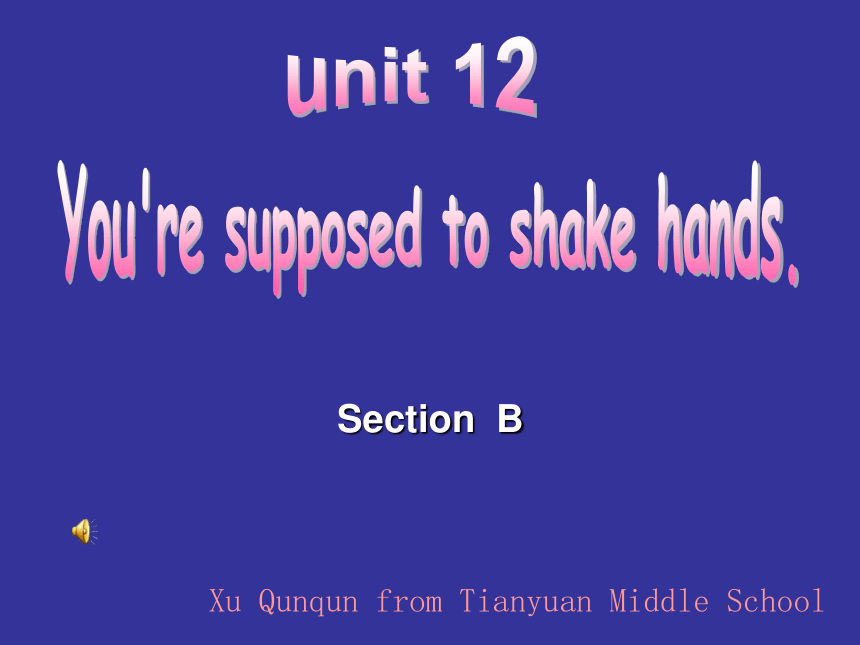 | |
| 格式 | zip | ||
| 文件大小 | 11.2MB | ||
| 资源类型 | 教案 | ||
| 版本资源 | 人教新目标(Go for it)版 | ||
| 科目 | 英语 | ||
| 更新时间 | 2012-03-15 10:42:26 | ||
图片预览

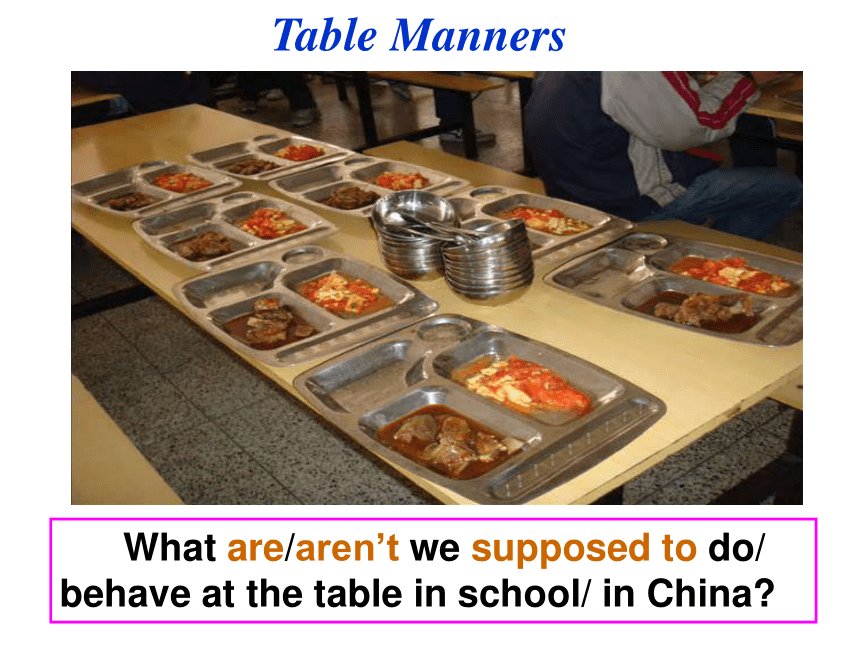
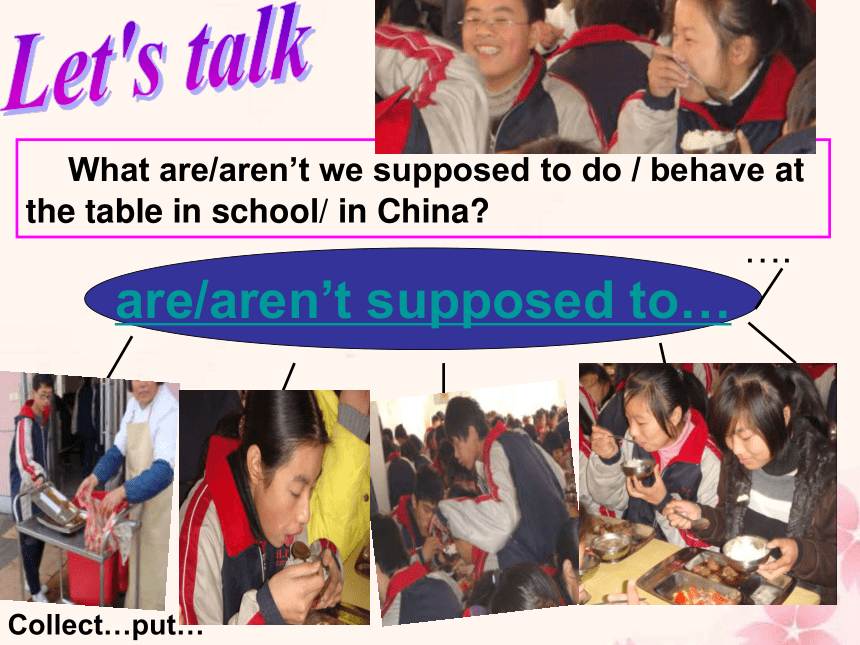
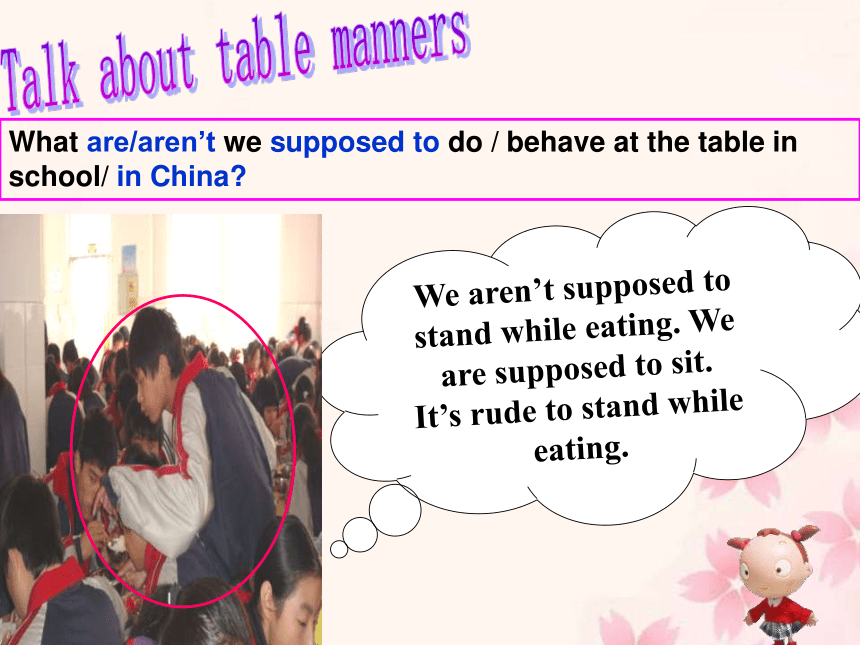
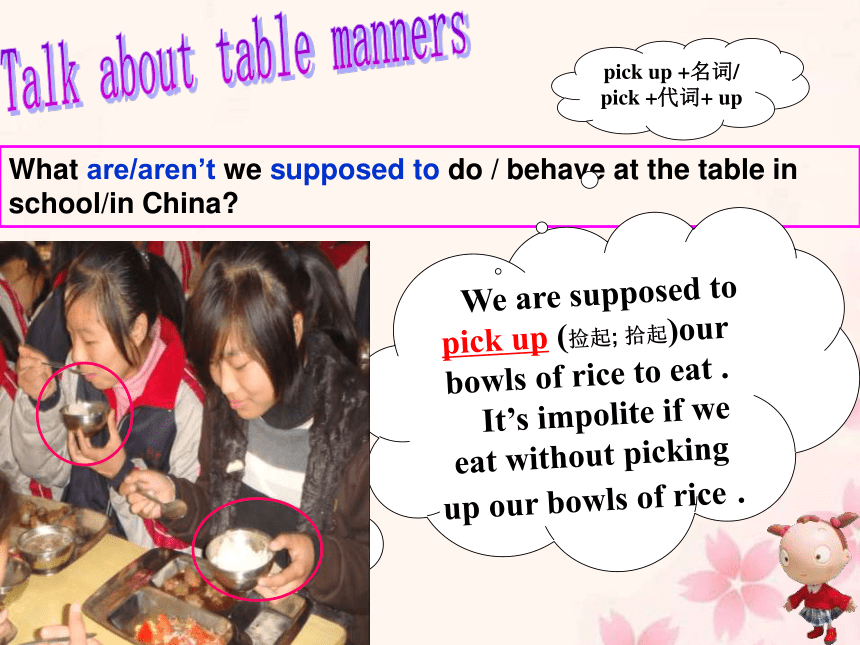
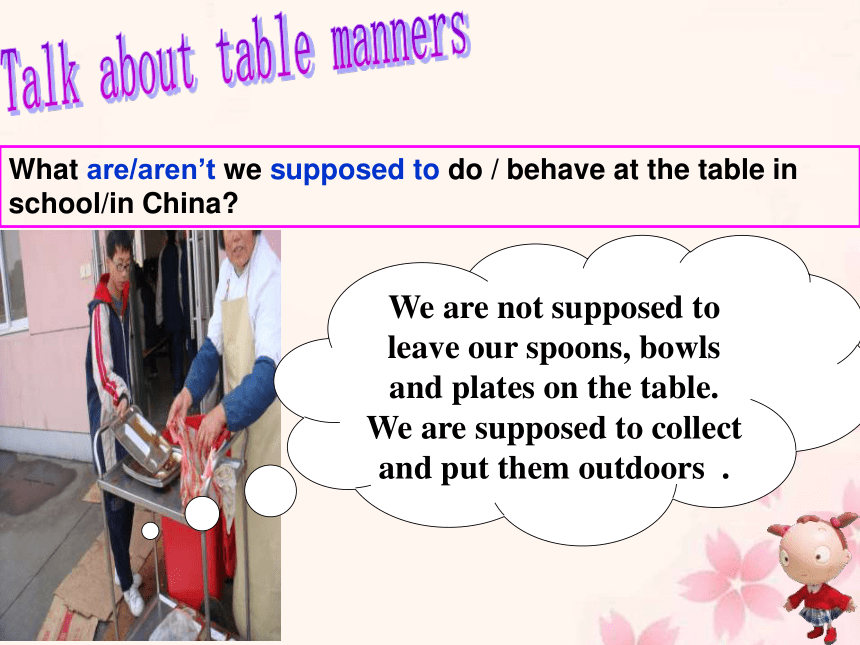
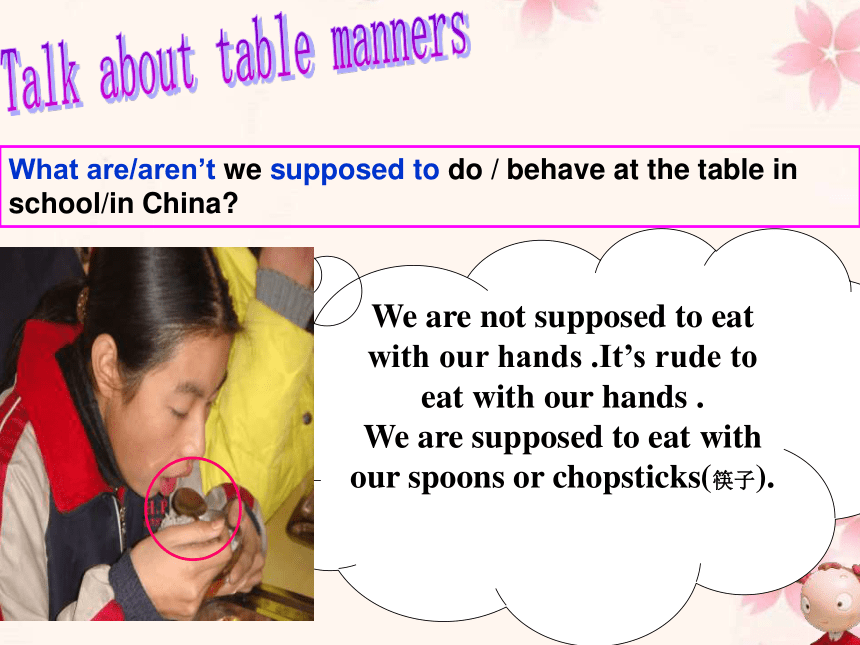
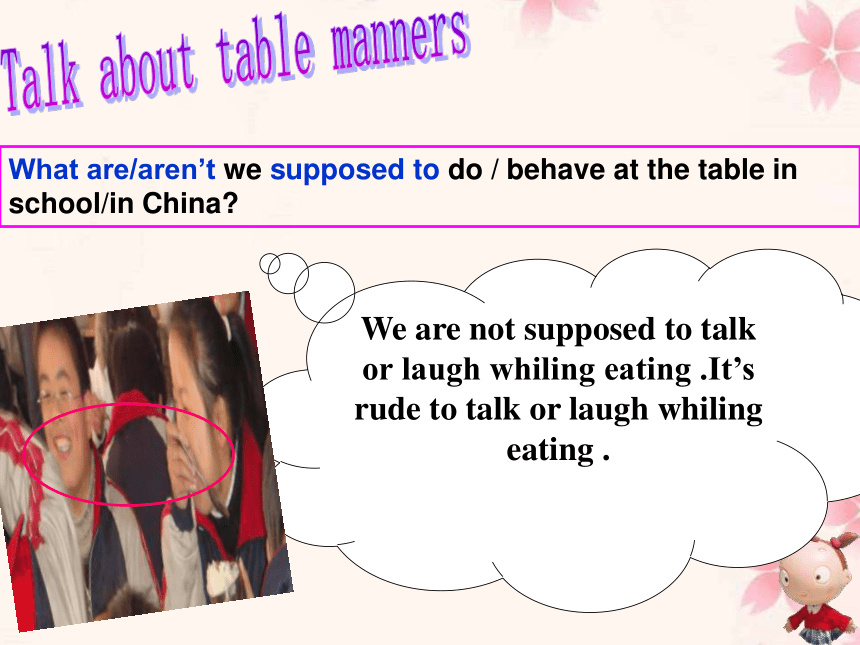
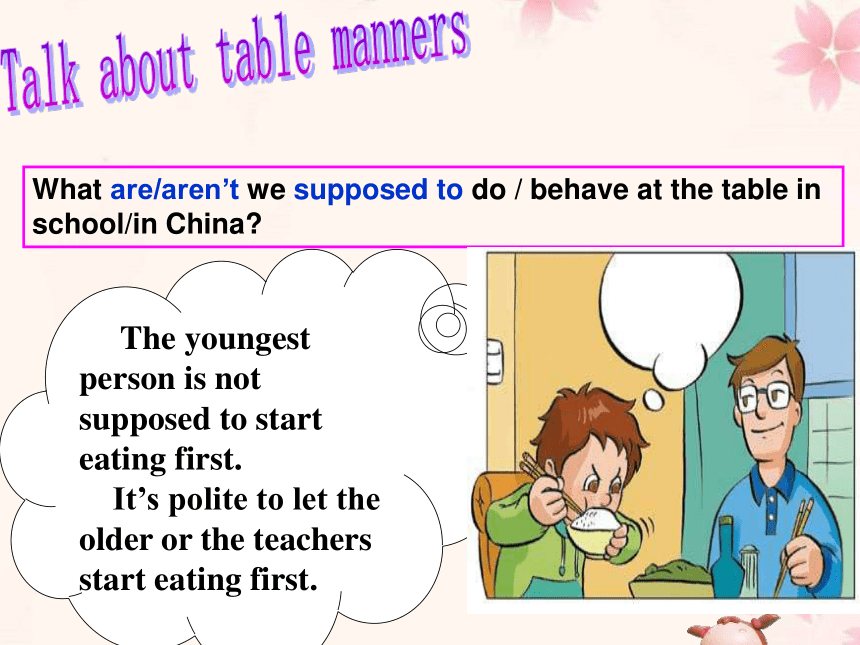
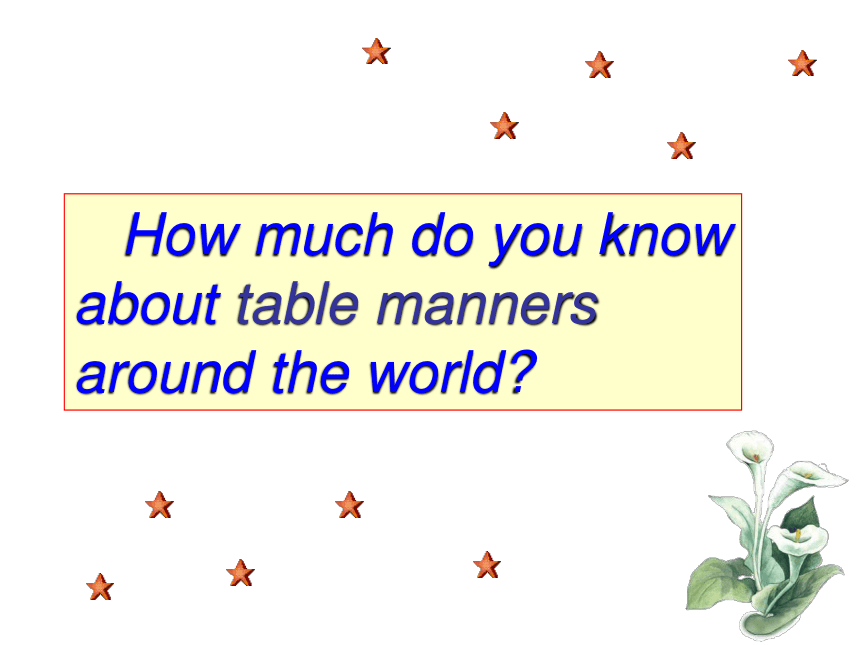

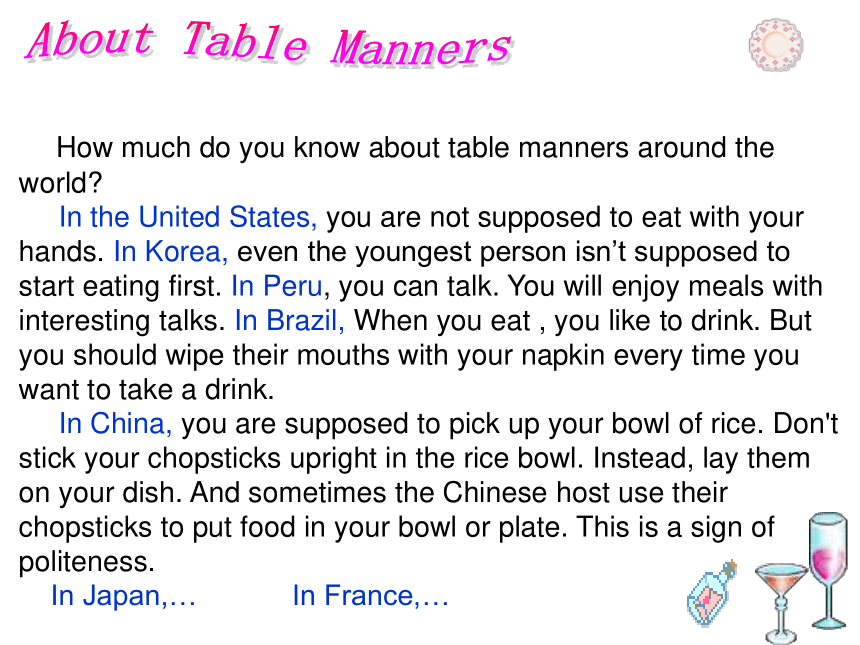
文档简介
(共38张PPT)
Section B
Xu Qunqun from Tianyuan Middle School
Table Manners
What are/aren’t we supposed to do/ behave at the table in school/ in China
What are/aren’t we supposed to do / behave at the table in school/ in China
are/aren’t supposed to…
…
Collect…put…
….
What are/aren’t we supposed to do / behave at the table in school/ in China
We aren’t supposed to stand while eating. We are supposed to sit.
It’s rude to stand while eating.
What are/aren’t we supposed to do / behave at the table in school/in China
We are supposed to pick up (捡起; 拾起)our bowls of rice to eat .
It’s impolite if we eat without picking up our bowls of rice .
pick up +名词/
pick +代词+ up
What are/aren’t we supposed to do / behave at the table in school/in China
We are not supposed to leave our spoons, bowls and plates on the table.
We are supposed to collect and put them outdoors .
What are/aren’t we supposed to do / behave at the table in school/in China
We are not supposed to eat with our hands .It’s rude to eat with our hands .
We are supposed to eat with our spoons or chopsticks(筷子).
What are/aren’t we supposed to do / behave at the table in school/in China
We are not supposed to talk or laugh whiling eating .It’s rude to talk or laugh whiling eating .
What are/aren’t we supposed to do / behave at the table in school/in China
The youngest person is not supposed to start
eating first.
It’s polite to let the older or the teachers start eating first.
How much do you know about table manners around the world
1.In the United States, you’re not supposed to
eat with your hands.
2.In Peru, you are not supposed to
talk at the table.
3.In China, you’re not supposed to pick up (拿起)
your bowl of rice.
4.In Korea, the youngest person is
supposed to start eating first.
5.In Brazil, you should wipe(擦) your mouth
with your napkin (餐巾纸) every time you take a drink.
1a
How much do you know about table manners around the world Take the following quiz. Circle “T”( for true) or “F” (for false).
T F
T F
T F
T F
T F
Mind your manners !
How much do you know about table manners around the world
In the United States, you are not supposed to eat with your hands. In Korea, even the youngest person isn’t supposed to start eating first. In Peru, you can talk. You will enjoy meals with interesting talks. In Brazil, When you eat , you like to drink. But you should wipe their mouths with your napkin every time you want to take a drink.
In China, you are supposed to pick up your bowl of rice. Don't stick your chopsticks upright in the rice bowl. Instead, lay them on your dish. And sometimes the Chinese host use their chopsticks to put food in your bowl or plate. This is a sign of politeness.
In Japan,… In France,…
Do you know how to behave at the table in Japan and in France
eat or drink while walking down the street
stick his chopsticks into his food
make noise while eating noodles
point at anyone with her chopsticks
stick sth. into sth.
把…刺入/插入…
make noise
发出噪音
point at sth./sb.
指向…
2a
Tomorrow Steve is going to Japan to be an exchange student. His Japanese friend Satoshi is telling him about the table manners in Japan. Listen and number the pictures.
( )
( )
( )
( )
2
1
4
3
2b
Listen and help Steve match these sentences parts.
___1. You aren’t
supposed to …
___2. It’s polite …
___3. It’s rude …
___4. You
shouldn’t… to make noise while eating noodles
to stick your chopsticks into your food.
point at anyone with your chopsticks
eat or drink while walking down the street
d
a
c
b
Can you tell us something about Steve and Japan
Listening report
Steve is excited about leaving for Japan. But he is still _______________. So his Japanese friend Satoshi is telling him about ______________________ in Japan.
In Japan, you are not supposed to______________ while _____________ the street, and it’s polite to _____________ when you are eating noodles. It shows that you _____________.Also, there are chopstick rules.
It’s______ to_____________________________________ And you shouldn’t ______________________________________.
a little nervous
the table manners
eat or drink
walking down
make noise
like the food
rude
stick your chopsticks into your food
point at anyone with your chopsticks
leave for +地点名词.
离开去某地…
Let’s know about the table manners in France.
3a
You are supposed to…
You aren’t supposed to …
put your bread on your plate.
put it on the table.
eat anything with your hands except bread.
cut fruit up and eat it with a fork.
say you are full.
say “It was delicious.”
put your hands in your lap.
keep your hands on the table.
a list of table manners in France
New Words
get out of one’s way to do sth.
特地(不怕麻烦地)做某事
make sb. feel at home 使某人感到宾至如归
be/get used to 习惯于……
fork 叉、餐叉 lap 大腿
elbow 肘部 occur 发生
gradually 逐渐地 particular 特殊的
1.Why was Wang Kun nervous before
she arrived in France
2.Why did she have no reason to be nervous
3.What differences have occurred in her French
4.What does she find surprising
5.What is one particular challenge she is facing
1.Why was Wang Kun nervous before
she arrived in France
Because her French was not very good.
2.Why did she have no reason to be nervous
Because her host family was really nice.
3.What differences have occurred in her French
She is very comfortable speaking French now.
4.What is one particular challenge she is facing
One particular challenge is learning how to behave at the dinner table.
5.What does she find surprising
You put your bread on the table, not on the plate.
1.Wang Kun is having fun on his exchange program in France. ( )
2.It’s worse than he thought it would be. ( )
“It’s even better than I thought it would be.”
3. Although his French has improved, Wang Ku still dislikes speaking French. ( )
True or False
F
F
T
“And you wouldn’t believe how quickly my French has improved. I’m very comfortable speaking French now.”
4.He likes his host family, because they are friendly to him. ( )
5.Things in France is quite different from the way at home. ( )
6.Wang Kun hasn’t been used to things in France. ( )
True or False
F
T
T
“I find it difficult to remember everything, but I’m gradually getting used to things .”
be /get used to sth. 习惯于某事
A
B
C
D
E
Attention1:Each star includes different marks and tasks!
Attention2:Everyone in your group can stand up and say out your answer3 if he /she know the answers.
Please say 6 sentences about the table manners in Japan without any help in 10 seconds. (18’ )
They aren’t supposed to…
/They should …
/They shouldn’t …
/It’s rude to …
/ It’s polite to …
Please do 12 actions which must be rude or polite in 10 seconds.(12’ )
Please say out 8 places of interest in China in 10 seconds. (10’ )
/They aren’t supposed to…
/They should …
/They shouldn’t …
/It’s rude to …
/ It’s polite to …
Please dance as we do before the class. (Three marks every student )
Please say 6 sentences about the table manners in France without any help in 15 seconds. (18’ )
They aren’t supposed to…
/They should …
/They shouldn’t …
/It’s rude to …
/ It’s polite to …
A: Hello, B. Can you tell me something about the table manners in China. B: Sure.
A: What are you supposed to… B:….
A: Hello,What are you supposed to… C:….
Make an interview
If you were a foreign visitor in China, you want to know about the table manners in China. Now you are interviewing
your Chinese friends.
Attention1:Please get as many table manners as you can.
Attention2:You can leave your seats and ask classmates
in other groups.
Write an e-mail message telling someone from another country about the table manners in your country.
Section B
Xu Qunqun from Tianyuan Middle School
Table Manners
What are/aren’t we supposed to do/ behave at the table in school/ in China
What are/aren’t we supposed to do / behave at the table in school/ in China
are/aren’t supposed to…
…
Collect…put…
….
What are/aren’t we supposed to do / behave at the table in school/ in China
We aren’t supposed to stand while eating. We are supposed to sit.
It’s rude to stand while eating.
What are/aren’t we supposed to do / behave at the table in school/in China
We are supposed to pick up (捡起; 拾起)our bowls of rice to eat .
It’s impolite if we eat without picking up our bowls of rice .
pick up +名词/
pick +代词+ up
What are/aren’t we supposed to do / behave at the table in school/in China
We are not supposed to leave our spoons, bowls and plates on the table.
We are supposed to collect and put them outdoors .
What are/aren’t we supposed to do / behave at the table in school/in China
We are not supposed to eat with our hands .It’s rude to eat with our hands .
We are supposed to eat with our spoons or chopsticks(筷子).
What are/aren’t we supposed to do / behave at the table in school/in China
We are not supposed to talk or laugh whiling eating .It’s rude to talk or laugh whiling eating .
What are/aren’t we supposed to do / behave at the table in school/in China
The youngest person is not supposed to start
eating first.
It’s polite to let the older or the teachers start eating first.
How much do you know about table manners around the world
1.In the United States, you’re not supposed to
eat with your hands.
2.In Peru, you are not supposed to
talk at the table.
3.In China, you’re not supposed to pick up (拿起)
your bowl of rice.
4.In Korea, the youngest person is
supposed to start eating first.
5.In Brazil, you should wipe(擦) your mouth
with your napkin (餐巾纸) every time you take a drink.
1a
How much do you know about table manners around the world Take the following quiz. Circle “T”( for true) or “F” (for false).
T F
T F
T F
T F
T F
Mind your manners !
How much do you know about table manners around the world
In the United States, you are not supposed to eat with your hands. In Korea, even the youngest person isn’t supposed to start eating first. In Peru, you can talk. You will enjoy meals with interesting talks. In Brazil, When you eat , you like to drink. But you should wipe their mouths with your napkin every time you want to take a drink.
In China, you are supposed to pick up your bowl of rice. Don't stick your chopsticks upright in the rice bowl. Instead, lay them on your dish. And sometimes the Chinese host use their chopsticks to put food in your bowl or plate. This is a sign of politeness.
In Japan,… In France,…
Do you know how to behave at the table in Japan and in France
eat or drink while walking down the street
stick his chopsticks into his food
make noise while eating noodles
point at anyone with her chopsticks
stick sth. into sth.
把…刺入/插入…
make noise
发出噪音
point at sth./sb.
指向…
2a
Tomorrow Steve is going to Japan to be an exchange student. His Japanese friend Satoshi is telling him about the table manners in Japan. Listen and number the pictures.
( )
( )
( )
( )
2
1
4
3
2b
Listen and help Steve match these sentences parts.
___1. You aren’t
supposed to …
___2. It’s polite …
___3. It’s rude …
___4. You
shouldn’t… to make noise while eating noodles
to stick your chopsticks into your food.
point at anyone with your chopsticks
eat or drink while walking down the street
d
a
c
b
Can you tell us something about Steve and Japan
Listening report
Steve is excited about leaving for Japan. But he is still _______________. So his Japanese friend Satoshi is telling him about ______________________ in Japan.
In Japan, you are not supposed to______________ while _____________ the street, and it’s polite to _____________ when you are eating noodles. It shows that you _____________.Also, there are chopstick rules.
It’s______ to_____________________________________ And you shouldn’t ______________________________________.
a little nervous
the table manners
eat or drink
walking down
make noise
like the food
rude
stick your chopsticks into your food
point at anyone with your chopsticks
leave for +地点名词.
离开去某地…
Let’s know about the table manners in France.
3a
You are supposed to…
You aren’t supposed to …
put your bread on your plate.
put it on the table.
eat anything with your hands except bread.
cut fruit up and eat it with a fork.
say you are full.
say “It was delicious.”
put your hands in your lap.
keep your hands on the table.
a list of table manners in France
New Words
get out of one’s way to do sth.
特地(不怕麻烦地)做某事
make sb. feel at home 使某人感到宾至如归
be/get used to 习惯于……
fork 叉、餐叉 lap 大腿
elbow 肘部 occur 发生
gradually 逐渐地 particular 特殊的
1.Why was Wang Kun nervous before
she arrived in France
2.Why did she have no reason to be nervous
3.What differences have occurred in her French
4.What does she find surprising
5.What is one particular challenge she is facing
1.Why was Wang Kun nervous before
she arrived in France
Because her French was not very good.
2.Why did she have no reason to be nervous
Because her host family was really nice.
3.What differences have occurred in her French
She is very comfortable speaking French now.
4.What is one particular challenge she is facing
One particular challenge is learning how to behave at the dinner table.
5.What does she find surprising
You put your bread on the table, not on the plate.
1.Wang Kun is having fun on his exchange program in France. ( )
2.It’s worse than he thought it would be. ( )
“It’s even better than I thought it would be.”
3. Although his French has improved, Wang Ku still dislikes speaking French. ( )
True or False
F
F
T
“And you wouldn’t believe how quickly my French has improved. I’m very comfortable speaking French now.”
4.He likes his host family, because they are friendly to him. ( )
5.Things in France is quite different from the way at home. ( )
6.Wang Kun hasn’t been used to things in France. ( )
True or False
F
T
T
“I find it difficult to remember everything, but I’m gradually getting used to things .”
be /get used to sth. 习惯于某事
A
B
C
D
E
Attention1:Each star includes different marks and tasks!
Attention2:Everyone in your group can stand up and say out your answer3 if he /she know the answers.
Please say 6 sentences about the table manners in Japan without any help in 10 seconds. (18’ )
They aren’t supposed to…
/They should …
/They shouldn’t …
/It’s rude to …
/ It’s polite to …
Please do 12 actions which must be rude or polite in 10 seconds.(12’ )
Please say out 8 places of interest in China in 10 seconds. (10’ )
/They aren’t supposed to…
/They should …
/They shouldn’t …
/It’s rude to …
/ It’s polite to …
Please dance as we do before the class. (Three marks every student )
Please say 6 sentences about the table manners in France without any help in 15 seconds. (18’ )
They aren’t supposed to…
/They should …
/They shouldn’t …
/It’s rude to …
/ It’s polite to …
A: Hello, B. Can you tell me something about the table manners in China. B: Sure.
A: What are you supposed to… B:….
A: Hello,What are you supposed to… C:….
Make an interview
If you were a foreign visitor in China, you want to know about the table manners in China. Now you are interviewing
your Chinese friends.
Attention1:Please get as many table manners as you can.
Attention2:You can leave your seats and ask classmates
in other groups.
Write an e-mail message telling someone from another country about the table manners in your country.
同课章节目录
- Unit 1 How can we become good learners.
- Section A
- Section B
- Unit 2 I think that mooncakes are delicious!
- Section A
- Section B
- Unit 3 Could you please tell me where the restroom
- Section A
- Section B
- Unit 4 I used to be afraid of the dark.
- Section A
- Section B
- Unit 5 What are the shirts made of?
- Section A
- Section B
- Review of Units 1-5
- Unit 6 When was it invented?
- Section A
- Section B
- Unit 7 Teenagers should be allowed to choose their
- Section A
- Section B
- Unit 8 It must belong to Carla.
- Section A
- Section B
- Unit 9 I like music that I can dance to.
- Section A
- Section B
- Unit 10 You're supposed to shake hands.
- Section A
- Section B
- Review of Units 6-10
- Unit 11 Sad movies make me cry.
- Section A
- Section B
- Unit 12 Life is full of the unexpected
- Section A
- Section B
- Unit 13 We're trying to save the earth!
- Section A
- Section B
- Unit 14 I remember meeting all of you in Grade 7.
- Section A
- Section B
- Review of Units 11-14
